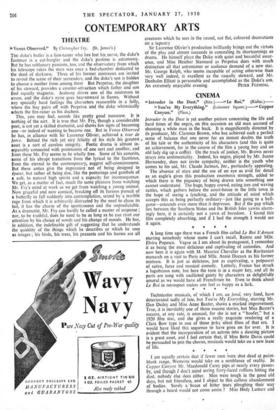_ CONTEMPORARY ARTS
THEATRE
'114 Venus Observed." By Christopher Fry. (St. James's.) THE duke's butler is a lion-tamer who has lost his,nerve, the duke's footman is a cat-burglar and the duke's pastime is astronomy. But he has sublunary passions, too, and the observatory from which his telescope rakes the stars was once a bed-chamber dedicated to the deed of darkness. Three of his former mistresses are invited to revisit the scene of their surrenders, and the duke's son is bidden to choose a mother from among them But Perpetua, the daughter of his steward, provides a counter-attraction which father and son find equally magnetic. Jealousy drives one of the mistresses to arson, and the duke's eyrie goes heavenward in flames. Without any specially hard feelings the characters reassemble in a folly, where the boy pairs off with Perpetua and the duke whimsically selects the fire-raiser as his duchess.
This, you may feel, sounds like pretty good nonsense. It is nothing of the sort. It is true that Mr. Fry, though a considerable poet, is not yet a skilled dramatist, and shows few signs of becoming one—or indeed of wanting to become one. But in Venus Observed he has, in alliance with Sir Laurence Olivier, achieved a tour de force. Behind the rich yet airy felicity of his style his greatest asset is a sort of careless integrity. Poetic drama is almost in- separably connected with pretensions of one sort and another, and from these Mr. Fry seems to be wholly free. Some of his conceits, some of his abrupt transitions from the lyrical to the facetious, from the eternal to the contemporary, suggest self-consciousness. But these antics give the impression not of being designed to ipater, but rather of being due, like the posturings and gambols of a colt, to natural high spirits and a capacity for inconsequence. We get, as a matter of fact, much the same pleasure from watching Mr. Fry's mind at work as we get from watching a young animal. Now graceful and now comical, breaking off its furious pursuit of a butterfly to fall suddenly into contemplation, seized by a terrible rage from which it is arbitrarily distracted by the need to chase its tail, it has the charm of the spontaneous and the unpredictable. As a dramatist, Mr. Fry can hardly be called a master of suspense ; nor, to be truthful, does he need to be as long as he can rivet our attention by his choice of words and his change of moods. He has, in addition, the indefinable gift of suggesting that he understands the quiddity of the things which he describes or which he uses as images ; his birds, his trees, his peasants and his horses are all creatures which he sees in the round, not flat, coloured decorations on a tapestry Sir Laurence Olivier's production brilliantly brings out the virtues of the play and almost succeeds in concealing its shortcomings as drama. He himself plays the Duke with quiet and beautiful assur- ance, and Miss Heather Stannard as Perpetua does with much distinction all that astronomer or audience demand of a new star. Mr. George Relph, who seems incapable of acting' otherwise than very well indeed, is excellent as the rascally steward, and Mr. Denholm Elliott is personable and accomplished as the Duke's son.
An extremely enjoyable evening. PETER FLEMING.










































 Previous page
Previous page